- Home
- Isabel Allende
Paula Page 2
Paula Read online
Page 2
“There is still time to change your mind,” he said. “Don’t marry him, Daughter, think better of it. Just give me a sign and I will run this mob out of here and send the banquet to the orphanage.” My mother replied with an icy stare.
Just as my grandmother had been warned by the spirits in one of her sessions, my parents’ marriage was a disaster from the very beginning. Once again, my mother boarded a ship, this time for Peru, where Tomás had been named secretary at the Chilean embassy. She took with her a collection of heavy trunks containing her bridal trousseau and a mountain of gifts, so much china, crystal, and silver that even now, a half-century later, we keep running into them in unexpected corners. Fifty years of diplomatic assignments in many latitudes, divorce, and long exile have not rid the family of this flotsam. I greatly fear, Paula, that among other ghastly prizes you will inherit a lamp that is still in my mother’s possession, a baroque chaos of nymphs and plump cherubs. Your house is monastically spare, and your meager closet contains nothing but four blouses and two pairs of slacks. I wonder what you do with the things I keep giving you? You’re like Memé, whose feet had scarcely touched solid ground before she removed the astrakhan coat and draped it over a beggarwoman’s shoulders. My mother spent the first two days of her honeymoon so nauseated by the tossing Pacific Ocean that she was unable to leave her stateroom; then, just as she felt a little better and could go outside to drink in the fresh air, her husband was felled by a toothache. While she strolled around the decks, indifferent to the covetous stares of officers and sailors, he lay moaning in his bunk. At sunset the vast horizon was flooded with shades of orange and at night a scandal of stars invited love, but suffering was more powerful than romance. Three interminable days had to pass before the patient allowed the ship’s physician to intervene with his forceps and ease the torment. Only then did the swelling subside, and husband and wife could begin married life. The next night they appeared together in the dining room as guests at the captain’s table. After a formal toast to the newlyweds, the appetizer was served: prawns arranged in goblets carved of ice. In a gesture of flirtatious intimacy, my mother reached across and speared a bit of seafood from her husband’s plate, unfortunately flicking a minute drop of cocktail sauce onto his necktie. Tomás seized a knife to scrape away the offensive spot, but merely spread the stain. To the astonishment of his fellow guests and the mortification of his wife, the diplomat dipped his fingers into his dish, scooped up a handful of crustaceans, and smeared them over his chest, desecrating shirt, suit, and the unsoiled portion of his tie; then, after passing his hands over his slicked-down hair, he rose to his feet, bowed slightly, and strode off to his stateroom, where he stayed for the remainder of the voyage, deep in a sullen silence. Despite these mishaps, I was conceived on that sea voyage.
Nothing had prepared my mother for motherhood. In those days, such matters were discussed in whispers before unwed girls, and Memé had given no thought to advising her about the libidinous preoccupations of the birds and the flowers because her soul floated on different planes, more intrigued with the translucence of apparitions than the gross realities of this world. Nevertheless, as soon as my mother sensed she was pregnant, she knew it would be a girl. She named her Isabel and established a dialogue that continues to the present day. Clinging to the creature developing in her womb, she tried to compensate for the loneliness of a woman who has chosen badly in love. She talked to me aloud, startling everyone who saw her carrying on as if hallucinating, and I suppose that I heard her and answered, although I have no memory of the intrauterine phase of my life.
My father had a taste for splendor. Ostentation had always been looked upon as a vice in Chile, where sobriety is a sign of refinement. In contrast, in Lima, the city of viceroys, swagger and swash is considered stylish. Tomás installed himself in a house incommensurate with his position as second secretary in the embassy, surrounded himself with Indian servants, ordered a luxurious automobile from Detroit, and squandered money on parties, gaming, and yacht clubs, without anyone’s being able to explain how he could afford such extravagances. In a short time he had managed to establish relations with the most illustrious members of Lima’s political and social circles, had discovered the weaknesses of each, and, through his contacts, heard a number of indiscreet confidences, even a few state secrets. He became the indispensable element in Lima’s revels. At the height of the war, he obtained the best whiskey, the purest cocaine, and the most obliging party girls; all doors opened to him. While he climbed the ladder of his career, his wife felt as if she was a prisoner with no hope for escape, joined at twenty to an evasive man on whom she was totally dependent. She languished in the humid summer heat, writing interminable pages to her mother; their correspondence was a conversation between the deaf, crossing at sea and buried in the bottom of mailbags. Nevertheless, as melancholy letters stacked up on her desk, Memé became convinced of her daughter’s disenchantment. She interrupted the spiritist sessions with her three esoteric friends from the White Sisterhood, packed her prophetic deck of cards in her suitcase, and set off for Lima in a light biplane, one of the few that carried passengers, since during times of war planes were reserved for military purposes. She arrived just in time for my birth. As her own children had been born at home with the aid of her husband and a midwife, she was bewildered by the modern methods of the clinic. With one jab of a needle, they rendered her daughter senseless, depriving her of any chance to participate in events, and as soon as the baby was born transferred it to an aseptic nursery. Much later, when the fog of the anesthesia had lifted, they informed my mother that she had given birth to a baby girl, but that in accord with regulations she could have her only during the time she was nursing.
“She’s a freak, that’s why they won’t let me see her!”
“She’s a precious little thing!” my grandmother replied, trying to sound a note of conviction, although she herself had not yet actually seen me: through the glass, she had spied a blanket-wrapped bundle, something that to her eyes did not look entirely human.
While I screamed with hunger on a different floor, my mother thrashed about, prepared to reclaim her daughter by force, should that be necessary. A doctor came, diagnosed hysteria, and administered a second injection that knocked her out for another twelve hours. By then my grandmother was convinced that they were in the anteroom to hell, and as soon as her daughter was conscious, she splashed cold water on her face and helped her get dressed.
“We have to get out of here. Put on your clothes and we’ll stroll out arm in arm like two ladies who’ve come to visit.”
“For God’s sake, Mama, we can’t go without the baby!”
“Of course we can’t!” exclaimed my grandmother, who probably had overlooked that detail.
The two women walked purposefully into the room where the newborn babies were sequestered, picked one out, and hastily exited, without raising an alarm. They could tell the sex, because the infant had a rose-colored ribbon around its wrist, and though there wasn’t enough time to be certain that it was theirs, that wasn’t vital anyway, all babies are more or less alike at that age. It is possible that in their haste they traded me for another baby, and that somewhere there is a woman with spinach-colored eyes and a gift for clairvoyance who is taking my place. Once safely home, they stripped me bare to be sure I was whole, and discovered a small birthmark in the shape of a sun at the base of my spine. “That’s a good sign,” Memé assured my mother. “We won’t have to worry about her, she’ll grow up healthy and blessed with good fortune.” I was born in August, under the sign of Leo, sex, female, and, if I was not switched in the clinic, I have three-quarters Spanish-Basque blood, one-quarter French, and a tot of Araucan or Mapuche Indian, like everyone else in my land. Despite my birth in Lima, I am Chilean. I come from a “long petal of sea and wine and snow,” as Pablo Neruda described my country, and you’re from there, too, Paula, even though you bear the indelible stamp of the Caribbean where you spent the years of your child
hood. It may be difficult for you to understand the mentality of those of us from the south. In Chile we are influenced by the eternal presence of the mountains that separate us from the rest of the continent, and by a sense of precariousness inevitable in a region of geological and political catastrophes. Everything trembles beneath our feet; we know no security. If anyone asks us how we are, we answer, “About the same,” or “All right, I guess.” We move from one uncertainty to another; we pick our way through a twilight region. Nothing is precise. We do not like confrontations, we prefer to negotiate. When circumstances push us to extremes, our worst instincts are awakened and history takes a tragic turn, because the same men who seem mild-mannered in their everyday lives can, if offered impunity and the right pretext, turn into bloodthirsty beasts. In normal times, however, Chileans are sober, circumspect, and formal, and suffer an acute fear of attracting attention, which to them is synonymous with looking ridiculous. For that very reason, I have been an embarrassment to my family.
And where was Tomás while his wife was giving birth and his mother-in-law effecting the discreet kidnapping of her first grandchild? I have no idea. My father is a great lacuna in my life. He went away so early, and vanished so completely, that I have no memory of him at all. My mother lived with him for four years, including two long separations—but sufficient time to bring three children into the world. She was so fertile that she became pregnant if a pair of men’s undershorts was waved anywhere within a radius of a half kilometer, a predisposition I inherited, although, to my good fortune, the age of The Pill arrived in time for me. With each birth her husband disappeared—as he did at the sign of any major difficulty—and then, once the emergency was over, returned, beaming, with some extravagant present. She watched the proliferation of paintings on the walls and Chinese porcelains on the shelves, totally mystified at where all the money was coming from. It was impossible to explain such luxuries when others at the consulate could scarcely make ends meet, but when she asked him, my father gave her the runaround—just as he did when she asked about his nocturnal absences, his mysterious trips, and his shady friendships. My mother had two children, and was about to give birth to the third, when the whole house of cards of her innocence came tumbling down. Lima awoke one morning to rumors of a scandal that escaped the newspapers but filtered into every salon. It had to do with an elderly millionaire who used to lend his apartment to special friends for clandestine trysts. In the bedroom, lost among pieces of antique furniture and Persian tapestries, hung a false mirror in a heavy baroque frame—actually, a window. On the other side, the master of the house liked to sit with a select group of guests, well supplied with liquor and drugs, eager to enjoy the antics of the current, usually unsuspecting, couple in the bed. That night a high-ranking politician was among the invited. When the curtain was drawn for the voyeurs to spy on the unwary lovers, the first surprise was that they were two males; the second was that one of them, decked out in a corset and lace garters, was the eldest son of the politician, a young lawyer destined for a brilliant career. In his humiliation, the father lost control; he kicked out the mirror, threw himself on his son to tear off the women’s frippery, and, had he not been restrained, might have murdered him. A few hours later every circle in Lima was humming with the particulars of the event, adding more and more scabrous details with each telling. It was suspected that it was not a chance incident, that someone had planned the scene out of pure malice. Frightened, Tomás disappeared without a word. My mother did not hear of the scandal until several days later; she was isolated by the demands of her series of pregnancies, and also by a desire to escape the creditors who were clamoring for payment. Tired of waiting for their wages, the servants had deserted; only Margara remained, a Chilean employee with a hermetic face and heart of stone who had served the family since the beginning of time. It was in these straits that my mother felt the pangs of imminent birth. She gritted her teeth and prepared to have the baby under the most primitive circumstances. I was almost three, and my brother Pancho was barely walking. That night, huddled together in the corridor, we heard my mother’s moans and witnessed Margara scurrying back and forth with towels and kettles of hot water. Juan came into the world at midnight, tiny and wrinkled, a hairless wisp of a mouse, barely breathing. It was soon obvious that he couldn’t swallow; he had some knot in his throat that wouldn’t let food pass. Although my mother’s breasts were bursting with milk, he was destined to perish of hunger, but Margara was determined to keep him alive, at first by squeezing drops from milk-soaked cotton, then later using a wooden spoon to force a thick pap down his throat.
For years, morbid explanations for my father’s disappearance rattled around in my head. I asked about him until finally I gave up, recognizing that there is a conspiracy of silence around him. Those who knew him describe him to me as a very intelligent man, and stop there. When I was young, I imagined him as a criminal, and later, when I learned about sexual perversions, I attributed all of them to him, but the facts suggest that nothing so dramatic colored his past; he merely had a cowardly soul. One day he found himself trapped by his lies; events were out of control, so he ran away. He left the Foreign Service and never again saw my mother or any of his family or friends. He simply vanished in smoke. I visualized him—partly in jest, of course—fleeing toward Machu Picchu disguised as a Peruvian Indian woman, wearing a wig with long black braids and layers of many-colored skirts. “Don’t ever say that again!” my mother screamed when I told her my fantasy. “Where do you get such crazy ideas?” Whatever happened, he disappeared without a trace, although obviously he did not hie himself off to the thin, clear air of the Andes to live unnoticed in some Aymara village; he just descended a rung in the immutable scale of Chile’s social classes and became invisible. He must have returned to Santiago and walked the streets of the city center but as he did not frequent the same social milieu it was as if he had died. I never again saw my paternal grandmother or any of my father’s family—except for Salvador Allende, who out of a strong sense of loyalty kept in close touch with us. Nor did I see my father again, or hear his name spoken aloud. I know absolutely nothing about his physical appearance, so it is ironic that one day I was called to identify his body in the morgue—but that came much later. I’m sorry, Paula, that this character must disappear at this point, because villains always are the most delicious part of a story.
My mother, who had been brought up in a world of privilege in which women were excluded from money matters, entrenched herself in her house, wiped away the tears of abandonment, and found consolation in the fact that for a time, at least, she would not starve; she had the treasure of the silver trays, which she could pawn one by one to pay the bills. She was alone in a strange land with three children, surrounded by the trappings of wealth but without a cent in her pocketbook and too proud to ask for help. The embassy, nonetheless, was alert, and learned immediately that Tomás had disappeared, leaving his family in bankruptcy. The honor of the nation was at stake; they could not allow the name of a Chilean official to be dragged through the mud, much less permit his wife and children to be put out into the street by creditors. So the consul was sent to call on the family, with instructions to help them return to Chile with the greatest possible discretion. You guessed right, Paula, that man was your Tío Ramón, your grandfather, a prince, and the direct descendant of Jesus Christ. He himself tells that he was one of the ugliest men of his generation, but I think he is exaggerating. We can’t call him handsome, but what he lacks in good looks he more than makes up for in intelligence and charm. Besides, the years have lent him an air of great dignity. At the time he was sent to our aid, Tío Ramón was bone thin, had a greenish tint to his skin, a walrus mustache, and Mephistophelian eyebrows; he was the father of four children and a practicing Catholic, and not a spot on the mythic character he would become after he had shed his skin like a snake. Margara opened the door to this visitor and led him to the bedroom of her señora, who received him lying in bed surrounded b
y her children, still slightly battered by the youngest’s birth but glowing with striking beauty and youthful ebullience. The consul, who had scarcely known his colleague’s wife—he had always seen her pregnant, and with a remote air that did not invite closer contact—stood near the door, sinking into a swamp of emotions. As he questioned her about the intricacies of her situation and explained the plan to send her back to Chile, he was tormented by a stampede of wild bulls in the area of his chest. Calculating that there was no more fascinating woman alive, and failing to understand how her husband could have abandoned her—he would give his life for her—he sighed at the crushing injustice of having met her too late. She looked at him for a long moment, and finally agreed:
“All right, I will return to my father’s house.”
“In a few days a ship is leaving Callao for Vuh-Valparaíso. I’ll try to obtain passages,” he stammered.
“I shall be traveling with my three children, Margara, and the dog. I don’t know whether my baby will survive the trip, this little one is very weak,” and although her eyes were shining with tears, she refused to allow herself to cry.
In a flash, Ramón’s wife and his children filed before his eyes, followed by his father pointing an accusing finger, and his uncle, the bishop, holding a crucifix shooting rays of damnation. He saw himself excommunicated from the Church and disgraced in the Foreign Service, but he could think of nothing but this woman’s perfect face. He felt as if he had been blown off his feet by a hurricane. He took two steps toward the bed. In those two steps, his future was decided.
“From now on, I will look after you and your children. . . . Forever.”
Forever. What is that, Paula? I have lost count of the days in this white building where echoes reign and it is never night. The boundaries of reality have been blurred; life is a labyrinth of facing mirrors and deformed images. A month ago, at this very hour, I was a different woman. I have a photograph from that day. I am at a party launching the publication in Spain of my most recent novel. I am wearing a silver necklace and bracelets and an aubergine-colored dress. My nails are manicured and my smile confident. I am a century younger than I am today. I don’t know that woman; in four weeks, sorrow has transformed me. As I stood at a microphone describing the circumstances that led me to write The Infinite Plan, my agent pushed her way through the crowd and whispered in my ear that you had been taken to the hospital. I had a jolting presentiment that something fundamental had happened to change our lives. We had been together the day before, and you were very ill. When I landed in Madrid, I was surprised that you weren’t at the airport to greet me, as you always have been. I dropped my suitcases at the hotel and, still reeling from the long flight from California, rushed to your house, where I found you vomiting and burning with fever. You had just returned from a spiritual retreat with the nuns from the school where you work forty hours a week as a volunteer helping underprivileged children, and you told me it had been an intense and saddening experience. You were beset with doubts, your faith was fragile.

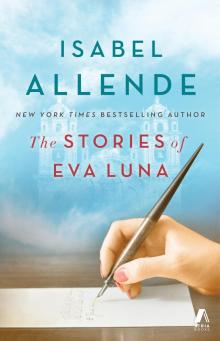 The Stories of Eva Luna
The Stories of Eva Luna The House of the Spirits
The House of the Spirits Paula
Paula Ines of My Soul
Ines of My Soul Of Love and Shadows
Of Love and Shadows Kingdom of the Golden Dragon
Kingdom of the Golden Dragon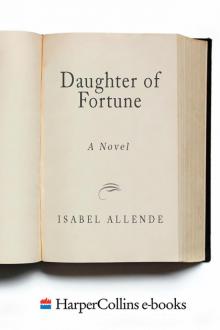 Daughter of Fortune
Daughter of Fortune City of the Beasts
City of the Beasts Maya's Notebook
Maya's Notebook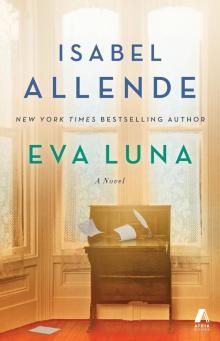 Eva Luna
Eva Luna Zorro
Zorro In the Midst of Winter
In the Midst of Winter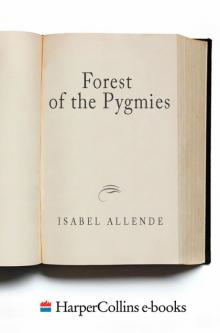 Forest of the Pygmies
Forest of the Pygmies My Invented Country: A Nostalgic Journey Through Chile
My Invented Country: A Nostalgic Journey Through Chile The Japanese Lover
The Japanese Lover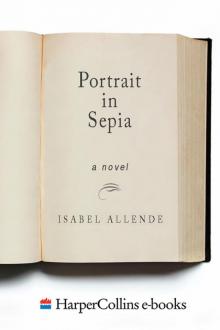 Portrait in Sepia
Portrait in Sepia Island Beneath the Sea
Island Beneath the Sea The Soul of a Woman
The Soul of a Woman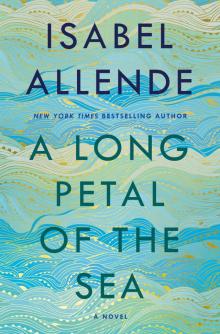 A Long Petal of the Sea
A Long Petal of the Sea Ines of My Soul: A Novel
Ines of My Soul: A Novel The Sum of Our Days
The Sum of Our Days